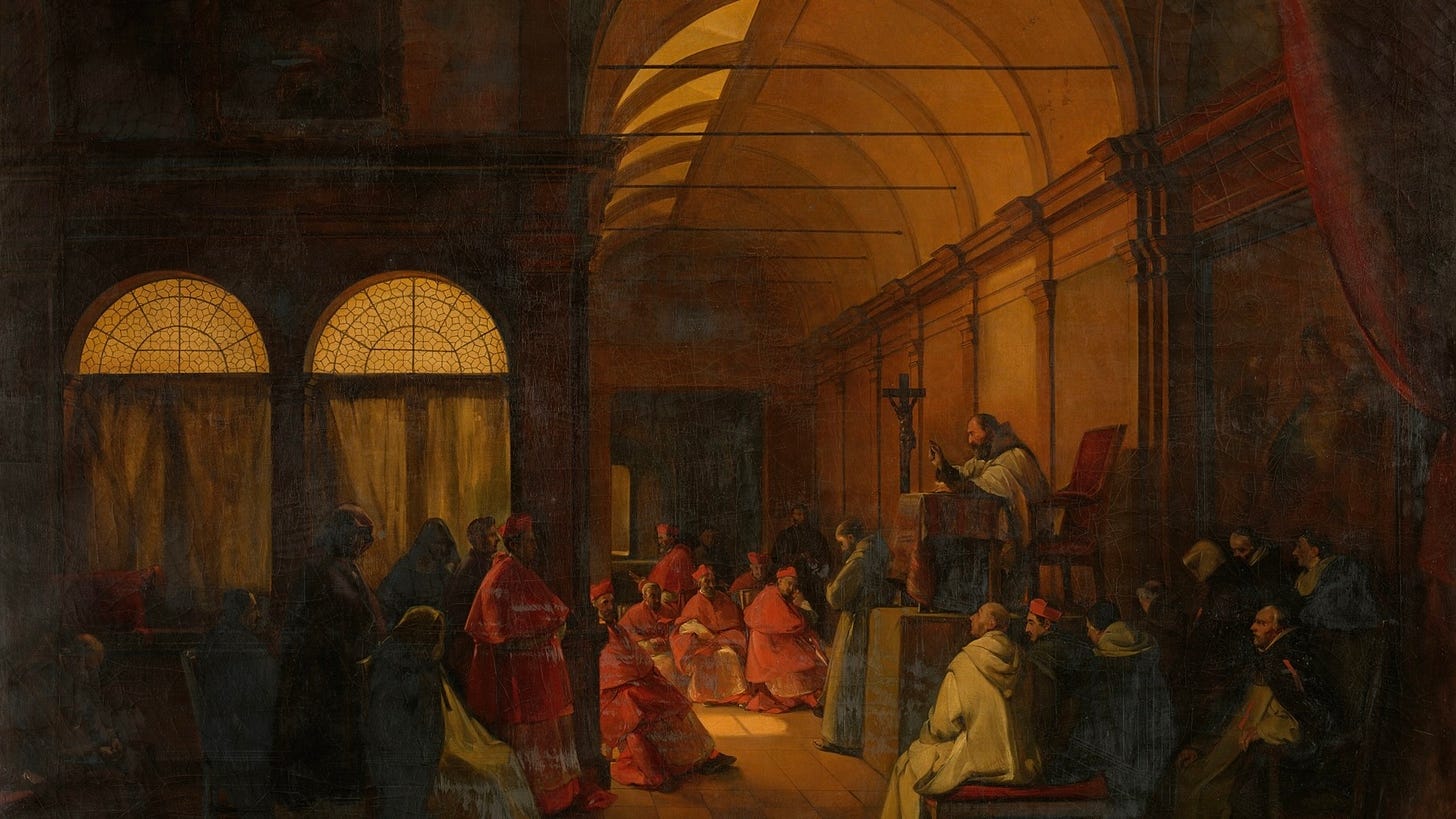"Conclave-Themed Bachelorette Party"
The future of the tech-trad alliance and public Catholicism.
Before last week, I would have felt safe predicting that the phrase “conclave-themed bachelorette party” would never occur in the natural world. But then again, that was last week.
This week, instructions from Slate:
As they get to know their assigned cardinals, encourage attendees to give speeches and mingle with one another — that’s how the real campaigning is done. Some cardinals can give speeches pitching someone else; that’s another traditional form of scheming. Urge people to think about what their papal name would be, as the winner will need to decide theirs on the spot. In the end, you’ll do a secret ballot and go until you have a clear winner — or until you’re bored …
The important thing is that you bring BuzzFeed-quiz-style energy to a solemn and holy ritual with significant implications for the spiritual lives of millions of people.”
The death of Pope Francis (occurring just hours after a visit from noted Catholic J.D. Vance) plus the highly regarded (and visually sumptuous) thriller Conclave, have combined with our moment’s deranged need for distraction to make Catholicism … hot again. Meme-makers are congratulating cardinals on their “joint slay.” Podcasters with no prior relationship to the church are discussing the ins and outs of Vatican bureaucracy. Pierbattista Pizzaballa, the Latin Patriarch of Jerusalem, has somehow become a household name. The discussions to determine the next pope begin on May 7th, and the world (and America especially) is locked in.
While this particular papal interregnum has garnered unusual virality, Catholicism (and traditional religion more broadly) been edging further into the public square for some time now.
In 1960, Democrat John F. Kennedy had to reassure the country of his belief in the separation of church and state, declaring that “no prelate would tell the president (should he be Catholic) how to act.” But in 2025, the Republican Vice President is a vocal Catholic convert, using Church theology to justify (improperly, according to the late pope) his administration’s immigration policies, while President Trump is sharing memes about becoming pope himself.
The paper of record has spent years at this point tracking how Catholicism has become the cool kids’ religion. Still, the pop-cultural fascination with Catholicism today seems like a lagging indicator, at least where politics are concerned. As a movement, traditional religionists no longer have the political Right to themselves. They now have to share that space with secular comrades.
In particular, I’ve been thinking these days about the newly ascendent tech Right, growing more influential in Trump’s second administration and in the culture overall: A phalanx of tech CEOs behind the inauguration dais, Elon Musk set loose on the federal government, Marc Andreesen as a political advisor. While the religious Right and the Tech Right gather (for now) under the same banner and appear to share some of the same concerns (falling birthrates! general “dynamism”!), a rift seems imminent and unavoidable.
Most commentators that I’ve seen describe this uneasy face-off in terms of populism versus oligarchy — deciding between privileging the “middle American” or further enriching already wealthy elites. But I think it goes deeper than economic policy: what is really going to divide the Right is a difference in belief, in a deeply spiritual sense. Traditional religionists (and Catholics in particular) have a particular view of the human person, the ideal form of society, that is at odds with the one that the tech Right idealizes and that its leaders perform. Is the solution to the birth crisis a renewed commitment to family life or is it an IVF-enabled harem? Is the cure to loneliness strong community, or 12 AI friends? Is the human person God-created and unique, or a piece of hardware that could and should be technologically improved?
Back to the Pope. The decline of Christianity in the US seems to have plateaued, Pew’s Religious Landscape Survey revealed earlier this year, and, at least anecdotally, new energy is emerging in more traditionalist denominations, including within Catholicism. Younger worshippers in particular tend to say that they’re attracted to traditional religion’s stability and clarity in a world wracked with change; a sense of transcendent meaning and purpose in an otherwise uncertain time.
This — especially when combined with the peerless aesthetics of “two cardinals in full regalia ripping heaters” — is where Catholicism still has an edge.
Wisdom of Crowds is a platform challenging premises and understanding first principles on politics and culture. Join us!






I wonder how many younger worshipers think about church authority. I'm not Catholic, but it seems like that's a pretty big speed bump for my own and younger generations. Even as a Protestant it took me a long time to get my arms around understanding how the body of Christ should have control over me: an autonomous being.
Not a particular agenda, with that line of thinking, but I am enjoying this turn of events. And I have to say, this is a VERY new world for Christianity to come back in vogue... Christine you've captured how "the darkness (or world rather) has not understood it" very nicely.
Even as it engages with timeless things, theology, and more broadly Christian living, is a product of its time.
A propos (or almost), a joke I've been making lately: "Conclave" and "Warfare" could share the same logline -- "a racially diverse group of men all wearing the same outfit must make tough choices when they're trapped in a building."